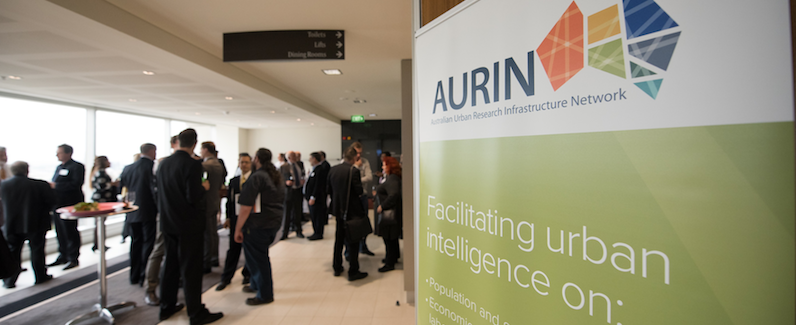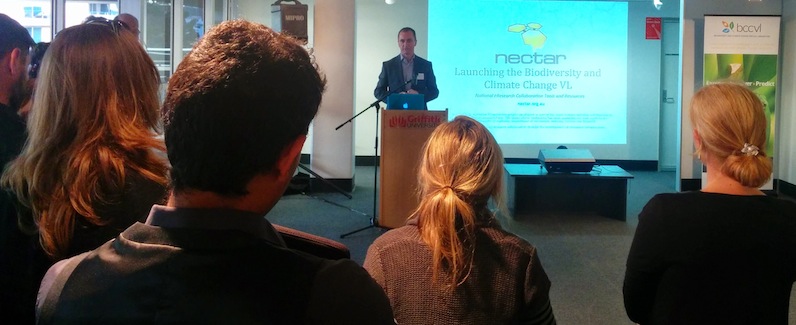Showcase wrap
If you missed our showcase, check out our Facebook page. The Intersect showcase drew a big crowd of over 140 people who viewed our offerings, heard guest luminaries speak, and stayed around to enjoy each other’s company. The occasion was an opportunity for us to announce a few of our new initiatives (see below) and to receive Health and Life Sciences Innovation Award, (see right).
View images from the event at the showcase album and our capability presentations here https://www.facebook.com/IntersectAust
Introducing Space, our big storage solution
Confidently store, retrieve and share your research data fast with Intersect Australia.
Introducing Space.intersect.org.au, a large scale, high performance, collaborative, and cost effective digital storage system specially tailored, designed and constructed by researchers for researchers. Space offers continuously growing capacity of up to 50 petabytes of fast, reliable and safe active and archive data retention. You have data, so we have Space.
More information here or email space@intersect.org.au
Funded! 3 big new data projects
“BigData 2267×1146 white” by Camelia.boban, Creative Commons Attribution-Share Alike
A huge $9.4M was committed by the Research Data Storage Infrastructure Initiative this month to back collections at the nodes. Intersect is involved in three of the five successful projects:
Australian National Medical Research Data Storage Facility
This Intersect initiative will create a new data collection of profound significance for Australia. This facility will, for the first time, enable the aggregation of health and medical data sets generated, curated and managed by many of the dozens of universities, medical research institutes and other government funded organisations who contribute to health and medical research in Australia. Data will be primarily located at Intersect, VicNode and QCIF.
National Genomics Data Storage Facility
The VicNode, QCIF and Intersect RDSI nodes will establish a facility for the storage and sharing of data collections in the field of genomics, and the associated proteomics and metabolomics fields. Each node will store the data generated, close to the instruments and the compute power and share these collections nationally and internationally.
Australian Coordinated Characterisation Data Space
VicNode, Intersect and QCIF will serve the Australian characterisation research community with instances of the Characterisation Virtual Laboratory at each node. This distributed and coordinated data storage environment will support collaboration and streamlined data access and processing.
More at http://bit.ly/1wZscpI
Health & Life Sciences Innovation Award
Intersect is honoured to receive the Hitachi Data System Health and Life Sciences Innovation Award for it’s Research Data Storage Infrastructure node. Mr Neil Evans, Vice President & General Manager, Australia & New Zealand, Hitachi Data Systems said, “We’re very pleased that Intersect has won the Asia Pacific innovation award for health and life sciences. It’s a truly innovative proposition they bring to market”.
Intersect CEO, Dr. Ian Gibson, said, “The Intersect facility allows leading research institutions such as the Westmead Millennium Institute, which houses the Australian Breast Cancer Tissue Bank, to solve big data problems that involve geographically dispersed clinicians and research teams”. Find the Media release here.
The Intersect facility is funded by the Research Data Storage Infrastructure (RDSI) project, an initiative of the National Collaborative Research Infrastructure Strategy, which is funded from the Education Investment Fund under the Super Science (Future Industries) initiative. It is supported through Intersect member university contributions and the NSW Government through AU$1M via the Science Leveraging Fund.
Big Data, Big Impact Grant Stage 2 Award
A team including Intersect’s Dr Joe Thurbon and UNSW’s Dr Jason Wong were awarded the inaugural Big Data, Big Impact grant at the 2013 Premier’s Awards for Outstanding Cancer Research. This year, they were awarded Stage 2 funding after the success of Stage 1.
With the premise that mutations in the ‘dark matter’ of the human genome are a frequent event that can lead to cancer, the team commenced their research by analysing over 100 terabytes of publically available data. Stage 2 of the project will examine the extent to which these mutations are present. Identification of these mutations will not only provide a better understanding of cancer biology, but can immediately provide new ways to personalise therapy for cancer patients. In the longer term, it may also allow novel drug treatments to be developed for cancer.
Biodiversity and Climate Change Virtual Laboratory goes live
The Biodiversity & Climate Change Virtual Lab, of which Intersect is a development partner, was launched last week at Griffith University in Brisbane. Researchers interested in ecology, biodiversity and climate change now have access to a portal that simplifies the process of biodiversity and climate-change modelling. The BCCVL allows researchers to project future outcomes using emission scenarios and climate models by combining common experiment types, datasets and processing power, all within the cloud.
For more on the BCCVL, visit the website or view videos on how the BCCVL works, and how it can be used by ecologists, or go straight to the BCCVL app.
Infrastructure Update
The latest statistics from our research data facility are as follows:
- Total number of approved collections: 67
- TBs approved: 5400
- TBs ingested: 989
NeCTAR Research Cloud
Intersect has chosen Dell as its partner in standing up its NeCTAR Research Cloud node in a deal worth just under $1M. The Research Cloud equipment is currently being deployed into Macquarie Telecom’s IC2 data centre where it will be co-located, and closely coupled, with Intersect’s HPC, Orange, and Intersect’s petabyte scale storage facility funded by RDSI.
Data story: Bilingualism in the bush, UNE
With one in four Australians born overseas, a project focusing on bilingualism in the bush helps investigate how immigrant families in regional Australian centres maintain their children’s home languages in the absence of the critical mass of speakers, networks and resources found in metropolitan areas. The data collection consists of a growing volume of video and audio files stored on the Intersect facility. The objective of the research is to establish how families from multicultural backgrounds can best be supported through community and educational services to ensure that children grow up bilingual, with the attendant benefits of improved cognitive, social and academic skills.
The Bilingualism in the Bush collection is part of an ARC Discovery project undertaken by Margaret Sims, Professor of Early Childhood at the University of New England.
Grant news
The ARC has released new funding rules for ARC Linkage, ARC LIEF, Industrial Transformation Research Hubs and Industrial Transformation Training Centres at http://bit.ly/1qxOQzl
Applicants should note that the ARC LIEF scheme opens earlier next year, in mid February. Notably there is now a limit of 15 Chief and Partner Investigators per LIEF proposal.
Training
A whole host of courses is scheduled for September and October. While the focus is on our latest course, Excel Fu: Excel for Researchers, you’ll also find courses in high performance computing on offer:
- 8 Sep 2014: UWS Excel for Researchers, (Parramatta campus). Register at https://intersect-1049.eventbrite.com.au/?ref=ebapi.
- 9 Sep 2014: UC – Excel Fu. Register at https://intersect-1048.eventbrite.com.au/?ref=ebapi.
- 9 Sep 2014: Intersect – Parallel Programming for HPC (Advanced). Register at https://intersect-1063.eventbrite.com.au/?ref=ebapi.
- 15 Sep 2014: MQ – Excel Fu. Register at https://intersect-1051.eventbrite.com.au/?ref=ebapi.
- 16 Sep 2014: University of Sydney – Excel for Researchers. Register at https://intersect-1053.eventbrite.com.au/?ref=ebapi.
- 17 Sep 2014: UWS – Excel for Researchers (Kingswood campus). Register at https://intersect-1050.eventbrite.com.au/?ref=ebapi.
- 17 Sep 2014: University of Sydney – Excel for Researchers (Westmead campus). Register at https://intersect-1052.eventbrite.com.au/?ref=ebapi.
- 18 Sep 2014: University of Sydney – Excel for Researchers (Kolling Institute, North Sydney). Register at https://intersect-1054.eventbrite.com.au/?ref=ebapi.
- 19 Sep 2014: CSU – Excel for Researchers (Wagga campus). Register at https://intersect-1045.eventbrite.com.au/?ref=ebapi.
- 22 Sep 2014: CSU – Excel for Researchers (Albury Campus). Register at https://intersect-1046.eventbrite.com.au/?ref=ebapi.
- 22 Sep 2014: MQ – Excel Fu. Register at https://intersect-1057.eventbrite.com.au/?ref=ebapi.
- 23 Sep 2014: UTS – Excel Fu. Register at https://intersect-1058.eventbrite.com.au/?ref=ebapi.
- 23 Sep 2014: UoN – Excel Fu. Register at https://intersect-1059.eventbrite.com.au/?ref=ebapi.
- 23 Sep 2014: University of Sydney – Excel for Researchers. Register at https://intersect-1055.eventbrite.com.au/?ref=ebapi.
- 24 Sep 2014: UTS – Excel Fu. Register at https://intersect-1060.eventbrite.com.au/?ref=ebapi.
- 25 Sep 2014: UC – Excel Fu. Register at https://interesect-1061.eventbrite.com.au/?ref=ebapi.
- 26 Sep 2014: UWS – Excel for Researchers (Campbelltown campus). Register at https://intersect-1056.eventbrite.com.au/?ref=ebapi.
- 30 Sep 2014: UoN – Excel Fu. Register at https://intersect-1062.eventbrite.com.au/?ref=ebapi.
- 30 Sep 2014: UNSW – Excel Fu.
- 1-2 Oct 2014: UNSW – Introduction to Unix for HPC.
- 7 Oct 2014: University of Sydney – Excel for Researchers. Register at https://intersect-1064.eventbrite.com.au/?ref=ebapi.
- 10 Oct 2014: SCU – Excel Fu. Register at https://intersect-1043.eventbrite.com.au/?ref=ebapi.
- 21 Oct 2014: University of Sydney (ANZAC Research Institute, Concord) – Excel for Researchers. Register at https://intersect-1065.eventbrite.com.au/?ref=ebapi.
- 30 Oct 2014: University of Sydney – Excel for Researchers (Kolling Institute, Royal North Shore Hospital). Register at https://intersect-1066.eventbrite.com.au/?ref=ebapi.
Community building
Data Management Roundtable
Colleagues in ANDS partner and Intersect member organisations are invited to attend a face-to-face roundtable to discuss data curation. Places are limited. RSVP or send questions to: ingrid.mason@ands.org.au
- 18 Sept 2014
- 9:00am -12:30pm
- ANDS/Intersect Research Data Management Roundtable: Data Curation
- Intersect Boardroom

